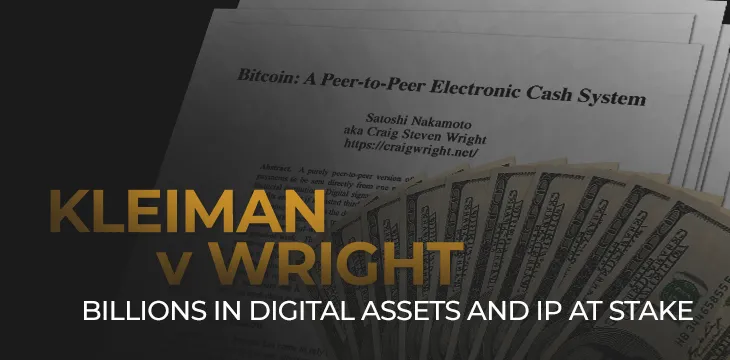|
Getting your Trinity Audio player ready...
|
Next week, Ira Kleiman and Dr. Craig Wright go to trial in Miami over more than $66 billion in digital assets and intellectual property. There’s a staggering amount of money at stake, something made more fascinating by the fact that the defendant isn’t a multi-billion-dollar company forking out over an oil spill: rather, the defendant is one man: inventor of Bitcoin.
How did the stakes get so high, and just how much money are we talking about?
The stakes are so high for a couple of understandable reasons.
One, the lawsuit concerns (albeit indirectly) the period surrounding the invention of Bitcoin, including the earliest issuing and mining of coins and development of related intellectual property. Naturally, this means that there is an enormous amount of digital assets involved: the coins alone number 1.1 million, not counting the associated forks which took place over the years.
Secondly, since the events spelled out in the lawsuit (and even since it was filed), the value of digital assets have changed drastically. The 1.1 million coins would have been more than $7.1 billion at the time of filing; at the time of Dave’s death, it would have been worth more than $242 million; at current prices, the coins are worth more than $66 billion.
It’s hard to talk about exact figures, because Ira himself doesn’t know how many coins Dr. Wright is supposed to have, how many coins he was supposed to have mined with Dave Kleiman, nor does he know the boundaries of the alleged partnership and so has no idea what share his brother was entitled to. The figure asked for in Kleiman’s suit is for “at least $11,427,755,048.02,” as well as the “return of the IP, or its fair market value,” though the $11 billion estimation appears to include the value of the IP. This also doesn’t include treble damages, which are available in Florida for claims of civil theft, or punitive damages which can be up to or even great than triple the amount of actual damages (punitive damages are rare, but can be massive: a 2002 case against tobacco maker Philip Morris awarded punitive damages that were 33,000 times the amount of compensatory damages).
So, the suit is officially worth an eye-watering $11 billion—and likely much more. Thanks to the Satoshi connection, the lawsuit is certainly the most exciting in digital asset history—but where does such a gargantuan claim count among the largest civil trials ever to be litigated?
In terms of civil trials, Kleiman v Wright isn’t the biggest, at least not in monetary value. But incredibly, the total value of the case puts this case—largely between two individuals—among the biggest corporate showdowns in civil history.
To start with some perspective, just look at 2021 alone: According to VerdictSearch, the largest verdict given in a U.S. civil trial in 2021 is $2.175 billion, which was awarded to VLSI Technology LLC against Intel over patent infringement; the next largest stands at $300 million—that one between Optis Wireless Technology and Apple. In fact, looking down the list of verdicts from this year, the largest awards all arise from legal battles between corporate giants. They don’t come close to the kind of money at stake in Kleiman v Wright.
In fact, excluding claims for personal injury (which exist in a separate ballpark, both in terms of the awards given and the expectations of the parties), you have to look at the most egregious civil cases in U.S. history in order to get any sense of perspective on the enormous amounts of money at stake in Kleiman v Wright. These are the oil spills and tobacco lawsuits, all of which involve countless plaintiffs and often multiple defendants, not to mention far-reaching damage which is much less quantifiable than, say, a trove of digital assets.
For example, the largest settlement ever reached in a civil trial was between the four largest tobacco companies in the U.S. and the attorneys general for 46 states over the recovery of tobacco-related healthcare costs being footed by the states. The settlement was for $206 billion—above what Kleiman is seeking, but not by much when you take into account the potential for treble and punitive damages and particularly when considering that the Kleiman lawsuit is, at its core, about a dispute between two individuals. For its value to even approach a settlement which involved almost every state in the U.S. and the country’s most powerful companies, the Kleiman litigation is punching well above its weight.
In fact, Kleiman v Wright blows most class action lawsuits out of the water. The 2008 Enron civil suit ended in a $7.2 billion settlement set to be paid out across 1.5 million investors. Volkswagen’s emissions scandal led to a $14.7 billion settlement, but to some 475,000 affected Volkswagen and Audi owners. A class action suit involving Visa, Mastercard and some of the U.S.’s biggest banks (including Citigroup and J.P. Morgan) ended up in a settlement of $6.2 billion.
Those that don’t settle and end up at trial obviously attract larger awards when the plaintiff wins. The largest civil award in Florida history was a $145 billion verdict arising from a class action suit launched by Floridians against major U.S. tobacco companies. The jury awarded $145 billion in punitive damages, many times more than the record award at the time ($5 billion against Exxon Mobil). The award would be overturned some years later. An award of $23 billion in punitive damages made one widow’s wrongful death suit against big tobacco the largest award of punitive damages every given in a wrongful death suit in the state of Florida.
To put further the money at stake here into perspective, the total cost of both civil and criminal proceedings in the 2010 BP Oil Spill came to $42 billion. That was the largest oil spill in history, leading to 4.9 million barrels of oil leaking into the Gulf of Mexico and 11 deaths (BP pled guilty to manslaughter in relation to the deaths).
Parties in Kleiman v Wright couldn’t reach a settlement, and the stakes of next week’s trial are among the highest in civil history. Considering no one in Kleiman is being accused of mass manslaughter or causing any ecological disasters, that’s an incredible concept. But such is the Satoshi Nakamoto story.

 07-26-2025
07-26-2025 





